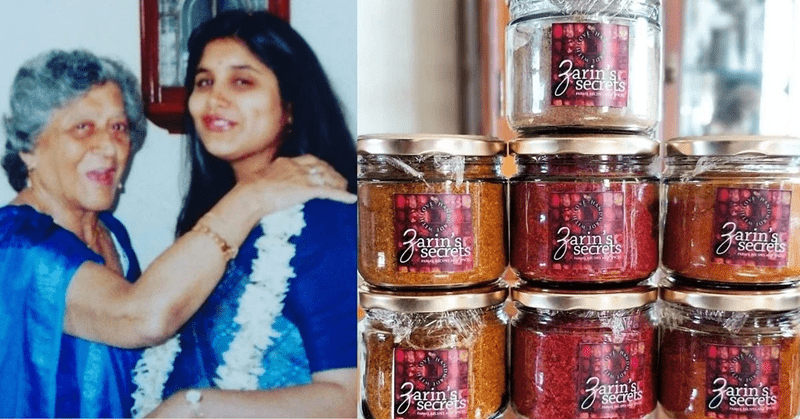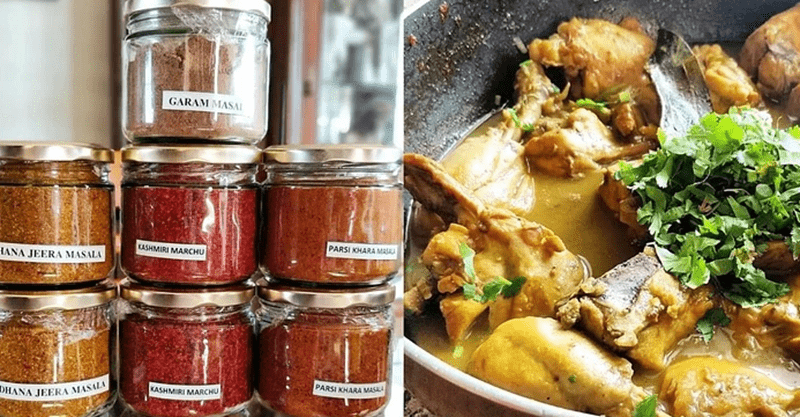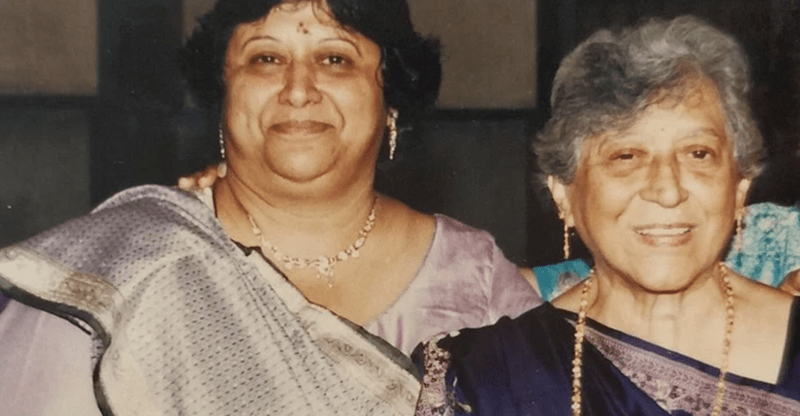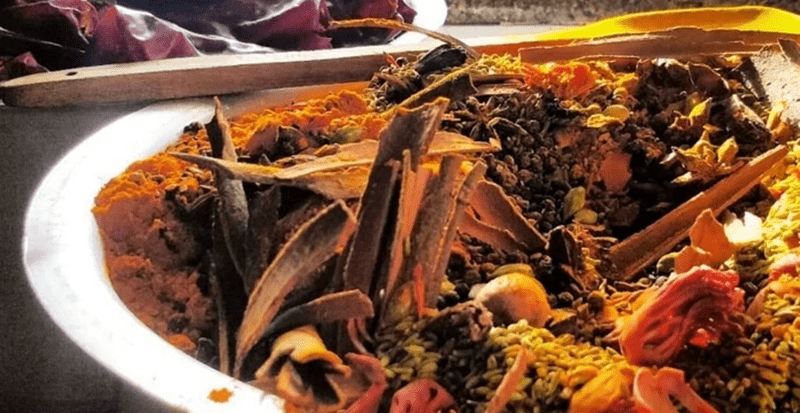Shelley Subawalla in Delhi is taking generations of Parsi family masalas and chutneys recipes to the world through ‘Zarin’s Secrets’ – named after her grandmother.
There remain few things that invoke the same sense of joy, nostalgia and unparalleled taste the way a grandmother’s cooking does. For me, it was my nani’s aloo parathe and pudina chutney, the taste of which I have spent years trying to find and recreate. For Shelley Subawalla, it was her grandmother’s Parsi-style kadhi-chawal and biryani that she remembers fondly.
Article by Divya Sethu | The Better India
“My grandmother, Zarin, was an excellent cook,” Subawalla, 45, a resident of New Delhi, tells The Better India. “She loved cooking, and nothing made her happier than trying out new recipes and feeding her grandchildren and relatives when they came to visit her.”
When Shelley first got married, she didn’t know how to cook. She’d call her grandmother every day to take instructions on the dish she was going to be making that day. Eventually, this led to Zarin sharing her own recipes of spice mixes with her granddaughter. “I started with just three to four spices, and would only make it for friends and family. Many of them advised that I should take it up professionally because Parsi cuisine is considered very niche. You do get Parsi food, but the spices to prepare the dishes aren’t too easily available,” she says, adding that she wanted to spread the word among non-Parsis that her cuisine was easy to cook.
Delhi resident Shelley Subawalla’s venture aims to integrate Parsi cuisine into the mainstream
Keeping family legacies alive
The Parsi community in India is shrinking, making the preservation of its cuisine even more important. According to the 2011 census, the number of Parsis in India stood at 57,264, and demographic trends projected that by 2020, their population would have fallen to a point where they would be known as a ‘tribe’ rather than a ‘community’.
In an attempt to preserve the community, Shelley launched Zarin’s Secrets, lovingly named after her grandmother, in 2015. She sells around 25 authentic Parsi spice mixes made from her grandmother’s repository of recipes along with contributions by other community members who wish to keep their family legacies alive.
Some of these include the dhansak masala (similar to garam masala, but the spices chosen tend to be more aromatic and sweet than pungent, and include cardamom, ginger, nutmeg, coriander, among others), Parsi khara masala, vasanu, and dhana jiru. “Many people think that the dhana jiru is just dhaniya and jeera powder, but the Parsi dhana jiru is made up of around 15-20 different spices, including elaichi, star anise, tezpatta, chillies, pepper balls, cloves…you name it, it’s got it. Dhansak and dhana jiru are a little similar, the former has maybe 3 to 4 less ingredients. The Parsi sambar mix has a mix of spices such as mustard and methi, and they’re mixed in mustard oil, so it’s a slightly wettish-powder. Another one is the curry masala, which has around 4 to 5 ingredients, including white sesame seeds, jeera, and khus khus,” says Shelley.
Of all the spices that Zarin’s Secrets sells, the ever-popular dhansak does the best. “Among the Parsis, the dhana jiru, sambar, pulao mixes all do well,” says Shelley.
With every product, Shelley provides a recipe that customers can use the masala in (Photo provided by Shelley Subawalla)
From grandma, with love
Around two years after Zarin’s Secrets was launched, other members of the community, and a few Parsi friends of Shelley’s, came forth to offer their own familial recipes. One such person was Indira, a resident of Gurugram, who had a repository of pickle recipes.
“Both my mother and grandmother used to live in a small town, so procuring even basic food items was hard sometimes. They made almost everything at home, from pickles to tomato ketchup,” Indira tells The Better India. She adds, “I watched them prepare these dishes as a child, but somehow never got into it myself. I took it for granted that they would be there to cook for me. My mother passed away very suddenly and left behind a bunch of recipes. When Shelley, who I have known for around 17 years, started selling her spice mixes, I shared my mom’s pickle recipes with her. She managed to emulate the same taste of my mother and grandmother’s cooking that I so loved.”
Indira’s mother and grandmother used to make excellent mutton pulao, she says, and mouthwatering pickles, including the nimbu-khajur. She has shared the recipes for this pickle, the marchu, and a green curry masala with Shelley’s venture. Indira was among those who pushed Shelley to start Zarin’s Secrets. “I can say that my mother and grandmother would be proud of Shelley for taking their recipes forward and helping integrate Parsi cuisine into the mainstream. It’s quite a lovely feeling for me as well, because it feels like these dishes have some essence of my mother and grandmother. Shelley’s business is highlighting how easy Parsi food is to make, almost as simple as cooking dal chawal,” she says.
All of the spice mixes in Zarin’s Secrets are almost 100 years old. Around five such families have shared their recipes with Zarin’s Secrets.
The venture is a unique family affair, and Shelley says she’s never given funding too much thought. Her son designed the first label for her company at its inception, and all the creative work is handled by her cousin, another one of Zarin’s granddaughters. Shelley has employed a part-time worker to help her out, but more or less heads the entire operation on her own. She refrains from making more than 5-6 kilos of masalas a day to ensure their freshness. Shelley’s spice mixes and pickles have travelled to various corners of the country, as well as the world. Within India, she has shipped to Assam, Leh, Jamshedpur, Kanpur, Kashmir and all the metro cities, among others. Outside the country, products have been sold to people living in the US, Canada, Australia, France, Ireland, the UK, Hong Kong, Singapore, Oman, and Bahrain, among others.
Most of her marketing and selling takes place through social media, mainly Facebook and Instagram, and word-of-mouth. Alongside Zarin’s Secrets, she also runs Frenny by Zarin’s Secrets, which she began during the COVID-19 lockdown. Under Frenny, named after her mother, she sells spices as well, but includes mixes from all over India. Some of them are the kolhapuri masala and the goda masala from Maharashtra, or the xacuti masala from Goa.
Shelley’s mother Frenny and grandmother Zarin, the two women behind both her ventures (Photo provided by Shelley Subawalla)
One woman’s mammoth mission
On her journey as a woman entrepreneur, she says, “When I had just started the venture, sourcing raw material was hard, because many vendors didn’t really know how to listen to a woman. I’d often have to make my husband speak to them instead. Of course, things have changed over the years, and now I can handle things on my own,” she says.
Another issue was juggling her responsibilities as a mother and her entrepreneurial venture. “I still had to make food for the house, and ensure the education of my children was on track, while handling my business,” Shelley adds.
At the onset of the pandemic, as courier and delivery services came to a halt, so did Shelley’s business. She could only restart once the services picked up. But when they did, her spices became even more in demand. People confined within their homes were looking to try out new dishes and upgrade their culinary skills, and that’s where Zarin’s Secrets helped.
Prices of the products have risen since the pandemic began, owing to the increase in the cost of raw material. The products are priced between Rs 300 and Rs 900 for pickle jars, depending on the sizes, and between Rs 250 and Rs 400 for the spices. “With food couriers, you anyway have to pay more than you would for normal products, because very few services allow you to ship food in the first place. So prices have remained slightly higher, but we’re doing well,” she adds.
Her yearly revenue reaches Rs 20 lakh per annum.
Roasted dhana jiru, ready to be ground (Photo provided by Shelley Subawalla)
“My biggest achievement has been repeat orders. With every packet of masala and pickles I hand out recipes on how customers can incorporate them in various dishes,” she says, adding, “All my non-Parsi customers are repeat customers. They’ve also grown up hearing about dishes like patrani macchi, so if they hear that I’m selling the chutney for the patrani macchi, they’re even more enthused to buy the mixes.”
Shelley says she acknowledges how her community has shrunk over the years, and that’s why keeping their culinary traditions alive is of utmost importance to her. She experiments with new recipes constantly and tests them on her family members, who she affectionately calls her ‘guinea pigs’.
From four products, Shelley now sells over 60 types of masalas and other food items in a mammoth mission to share her beloved heritage with people all over the world.
Zarin’s Secrets is available on Instagram and Facebook.
Edited by Yoshita Rao





